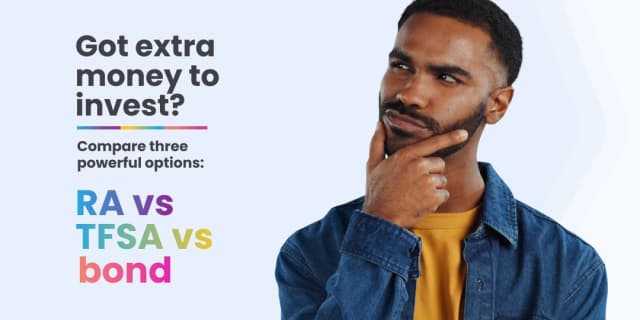A fixed deposit? No thanks!
31 March 2025

Moving jobs? How to grow your pension and protect your retirement through career change
The views and opinions expressed in this article are those of the author and do not necessarily reflect the official policy or position of 10X Investments.

Imagine your money as an employee. Would you would want them to show up to the office, put in the effort, and hopefully add more and more value to your business over time, or would you tell them, “Sit here, do nothing, and get your pay check every month, no worries!”
Putting your money in a fixed deposit is kind of like doing the latter.
For years, these accounts have been marketed as a ‘safe’ place to park your money. And sure, they offer some stability, but the real question is: Are they actually helping you build wealth? Spoiler alert: The answer is no. In fact, a very strong argument can be made that fixed deposits are actually costing you money. So if that is the case, why are they still being promoted? And more importantly, are there better alternatives out there? Well, let’s take a look.

What is a fixed deposit?
An easy definition of a fixed deposit is a place to lock away a lump sum of money for a set period (usually 3 months to 5 years) in exchange for interest payment at a guaranteed rate. You can’t touch the funds until the maturity date, and in return, you get slightly higher interest than a normal savings account. Sounds like a good deal, right? Well… not so fast.
When does a fixed deposit make sense?
While fixed deposits are generally not the best wealth-building tool (and we’ll talk about why further down), they can be quite useful in very specific situations:
- If you need to save for a short-term goal (e.g. buying a car in six months). This can be particularly helpful if you struggle with the discipline of leaving funds untouched.
- If you’re ultra-conservative, prefer to live under a rock, and are absolutely terrified of a little risk. If this is the case, you probably also want to consider wearing a reflective vest when you cross the parking lot at the mall, just to be safe.
- If you’re retired and no longer want to think at all. And even then, you’re probably better off spending the money. At least you’ll be able to put it towards experiences and making memories.
For everyone else? Fixed deposits are probably not the best way to grow your money, and there are several reasons why.
Four hidden downsides of fixed deposits
Fixed deposits often don’t beat inflation
Inflation is the silent thief that erodes the value of your money over time. If inflation is 6% per year (which isn’t unheard of in South Africa), and your fixed deposit earns 5%, you’re actually losing money in real terms. Which is a fancy way of saying that a loaf of bread, a tank of petrol, or school fees will cost more next year than they do today, and your fixed deposit won’t keep up.
Another way of looking at it is to imagine you’re a teacher earning R18,000 per month. You put R50,000 into a fixed deposit for 3 years at an annual interest rate of 5%. After 3 years, your money has grown to about R58,000. But due to inflation, what R50,000 could buy 3 years ago now costs R60,000 or more. Even though your money ‘grew’, it actually lost purchasing power while it was locked away.

Your money is locked away
A fixed deposit is like signing a gym contract - you’re stuck, even if you change your mind. If an emergency comes up i.e. your car breaks down, or you have unexpected medical bills, you can’t touch your money without facing penalties. This also means that if an investment opportunity comes up, your money is trapped earning low interest instead of working harder elsewhere.
The returns are underwhelming
Banks love to advertise fixed deposits as a ‘safe investment’, but the returns are hardly inspiring. The average fixed deposits usually offer between 6% and 8% interest. Currently, the best fixed deposit advertises an effective annual return of 9,25% after one year. And if you’re willing to forget about your money for 5 years, SA retail bonds currently promise annualised returns at 10,51% effective.
While the returns may look attractive at current levels, it is worth remembering that we are at the higher end of a rate cycle, and further rates cuts are expected in the future. This means that you can expect to be offered lower returns once the rate cycle changes. So if you’re young and saving for the long run, a fixed deposit isn’t helping your money grow fast enough.
For context, Coca-Cola has been paying more than 2% dividend for the last 20 years, including through the pandemic. They have paid dividends for over 60 straight years. And that doesn’t include the growth in the share price over that time.
Fixed deposits aren’t tax efficient
It may surprise you to know that the tax treatment on fixed deposits is likely to make them more harmful than useful as an investment tool. Given that fixed deposits are held in your personal name, the return would be looked at as taxable income subject to the interest exemptions applied. This means that your tax bracket could impact your returns.
On the other hand, investments of a capital nature, such as those in capital markets, are taxed at a capital gains tax rate which has a maximum effective tax rate of 18% for individuals at the moment.
So, what should you do instead?
Well thankfully, there are a few practical alternatives one could easily explore that do not require an advanced financial qualification. If the best we are looking to beat is 9.25% per year, then here are some relatively low-risk, far more flexible, ways that could potentially work. But before we get there, her are two very important questions:
Are you saving for retirement?
If you don’t have a company pension or provident fund, and you’re not contributing to a retirement annuity, you probably shouldn’t be looking to invest in elsewhere right now. A retirement annuity gives you tax money back (literally, SARS gives you money every year), and is a great way to force you to make sure you have income in retirement in the form of a living annuity or a life annuity (as retirement annuity or pension/provident funds must be converted to one of those two income-generating products in retirement).
Do you have an emergency fund?
Before investing, always keep 3-6 months’ worth of expenses in a liquid savings account—this is for emergencies. Unlike a fixed deposit, you can access these funds at any time. Some high-interest accounts offer competitive rates without locking your money away.
If you've answered yes to the above, you're in a good spot to consider the following options alongside a fixed deposit:
Option 1: Invest in ETFs (Exchange-Traded Funds)
An ETF is like a basket of stocks that grows with the market. Instead of earning single-digit interest in a fixed deposit, you could earn up to 12% per year with an ETF. You own real assets, and your money stays liquid, so you can sell any time. If you put R500 a month into an ETF, after 5 years, your investment could have grown 30% (depending on the market, obviously). The point is that you are exposing yourself to a lot more upside, with no accessibility problems. You can access ETFs via the 10X Unit Trust, which is a low cost, high performance way to make your money work harder.
Option 2: Consider dividend stocks
Some stocks pay regular cash dividends, which can provide income while your investment grows. Instead of locking money away in a bank, invest in shares of stable companies that pay dividends (e.g., banks, retailers, and telecom companies). You still get capital appreciation, plus passive income.
Option 3: Property as an alternative
If you’re looking for long-term wealth building, buying a small investment property (like a rental apartment) can offer good returns. Rent provides a steady income stream, and property values tend to rise faster than fixed deposit returns. A small, R250,000 apartment could be renting out for R3,500 per month - that’s R42,000 per year, which is far more than a fixed deposit could ever pay. Yes, you have to consider rates, maintenance and the hassle of tenanting. But again, you’re getting income and capital appreciation in the form of an asset that grows in value.
| Investment Type | Average Return Per Year | Flexibility | Beats Inflation |
|---|---|---|---|
Fixed Deposit | 5-7% | No | Maybe |
Dividend Stocks | 8-12% | Yes | Usually |
Index Funds (ETFs) | 8-12% | Yes | Usually |
Property Investment | 8-15% | Yes (if rental income) | Usually |
Having cash is not necessarily a bad thing. But leaving that money in a fixed deposit is like keeping a strong worker in a boring job forever—it might be safe(ish), but it’s not maximising potential. Instead of settling for lower returns, consider:
- High-yield savings accounts for emergency funds
- ETFs for steady long-term growth
- Dividend stocks for passive income
- Property for long-term wealth building
At the end of the day, your money should be working as hard as you do. Putting your funds into a fixed deposit is merely offering the bank the opportunity to make the returns you should be making.
Related articles
How can we 10X Your Future?
Begin your journey to a secure future with 10X Investments. Explore our range of retirement products designed to help you grow your wealth and achieve financial success.


